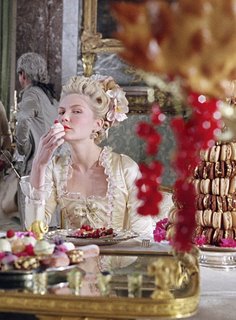 I thought this was going to be a total chick flick, and I was planning on sneaking off and seeing it by myself. Then Mr. Sweetie mentioned he was interested in seeing it, so we caught it in the last remaining theater before it left town.
I thought this was going to be a total chick flick, and I was planning on sneaking off and seeing it by myself. Then Mr. Sweetie mentioned he was interested in seeing it, so we caught it in the last remaining theater before it left town.What a gorgeous film! Everything was pretty--there was nothing that wasn't styled within an inch of its life, which was kind of the point. Beautiful people wearing beautiful clothes, eating beautiful food in beautiful rooms, buying beautiful shoes...
There were several things going on in the movie, none of which was an attempt to bring historical perspective to the screen. Instead, we have what one reviewer called "Lost in Versailles"--a child in a marriage she didn't fit, thrust into a foreign land with odd customs she couldn't understand. I also saw many similarities with Princess Diana--sneaking out from protocol to go to a party in disguise, the tempermental mismatch with her husband, the fascination/obligation of fashion, the ridiculous formality of life as a royal. Marie Antoinette was never a commoner, but as protrayed in this film, the difference between the Viennese court and Versailles was big enough that she might as well have been.
More than this, though, are the themes of helplessness. Marie Antoinette was a human being, thrust into a role where she had no control over her life and no way to succeed. She was trapped in a lose-lose situation throughout her life, and the movie shows us how a human being in that position might try to make the most of what she could.
To start with, her marriage to the Dauphin was seen as a strategic alliance between the Autro-Hungarian Empire and France. This marriage was politically and militarily important, and Marie Antoinette's position in France was only valuable to France if she produced an heir. Years went by with no pregnancy--possibly even with out consummation. As portrayed in the movie, this was not her fault. She did what she could to make herself attractive to a man who was paralyzed with fear about sex. She had the responsibility to bear a child, but no way to make that happen: she was caught between the demands of her mother, fear that her marriage could be annulled at any time, the hatred of the court...and with no power to make anything any better.
Writ large, this was her political problem with all of France. She was out of touch with the realities of French life, but there was no way she could ever have left the rigorous protocol and confines of life at Versailles. She--as the Austrian princess who lived esconced in a palace--became a flashpoint for political hatred. Yet it had almost nothing to do with the woman Marie Antoinette actually was. It was her role, her place in the world, about which she had no control and could do nothing to alter.
Early in the movie, the young princess is awakened from her sleep in Vienna: the curtains are abruptly pulled back and the light pours on her face, waking her. From then on, we see that her life is a series of rude awakenings--resonant both as a sign of her powerlessness (she isn't even allowed to be in charge of when she wakes up) and as a metaphor for her life.
It makes one wonder--why is it that we know of Marie Antoinette? How many other French queens can you name? How many other European queens of any country can you name? Especially those who were not themselves the ruler, but were the king's wife? So--why is she so reviled?

No comments:
Post a Comment